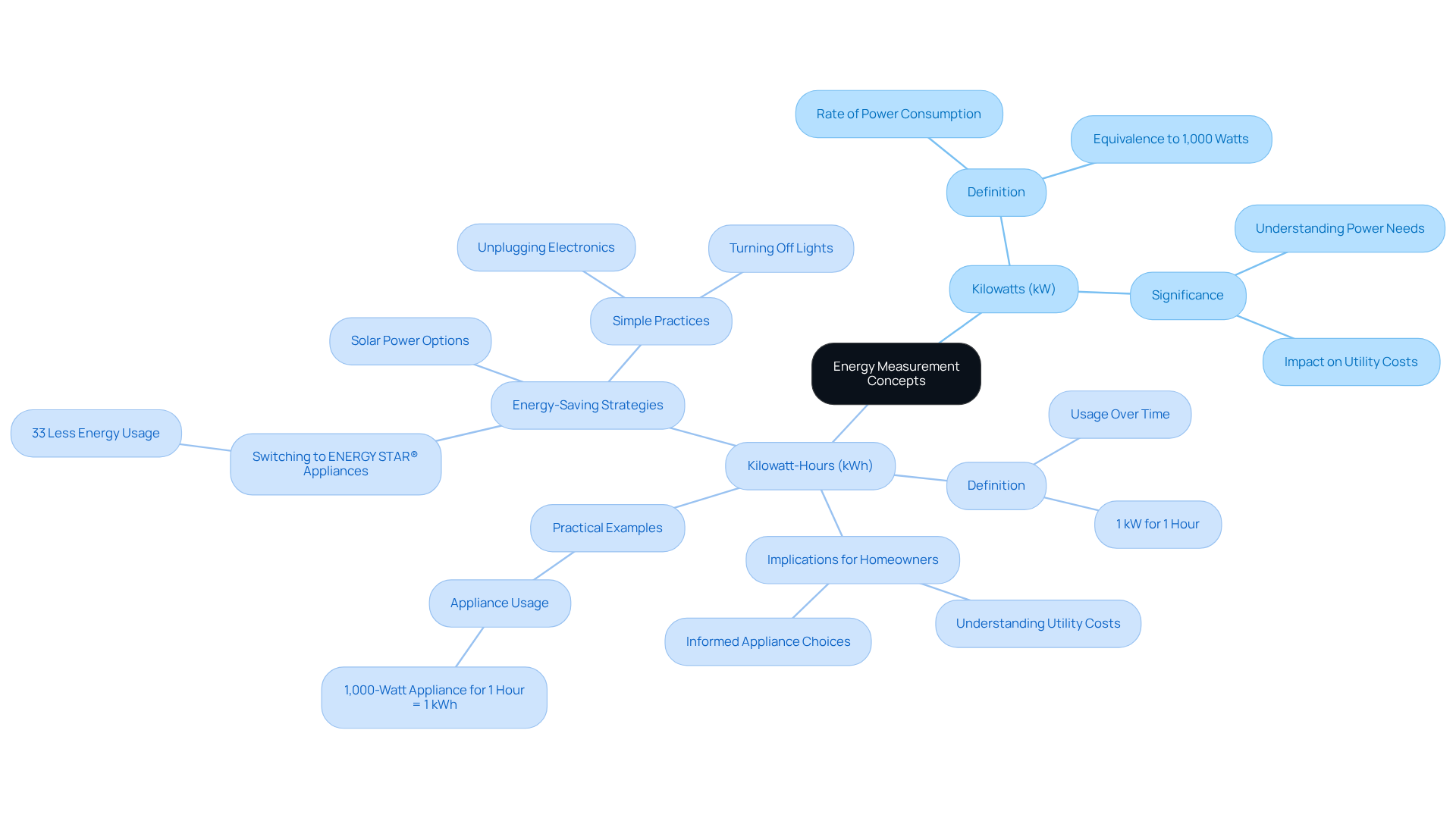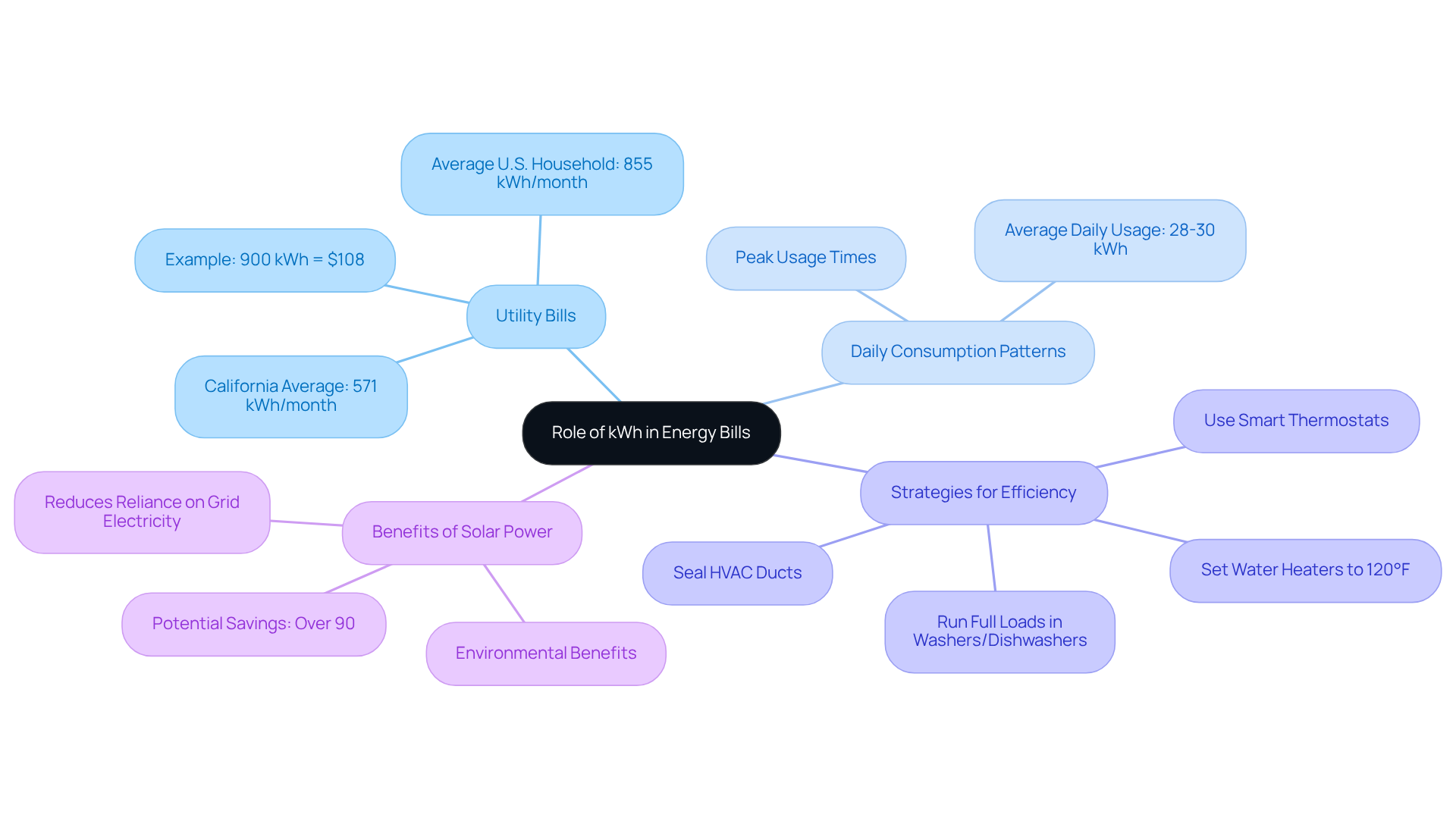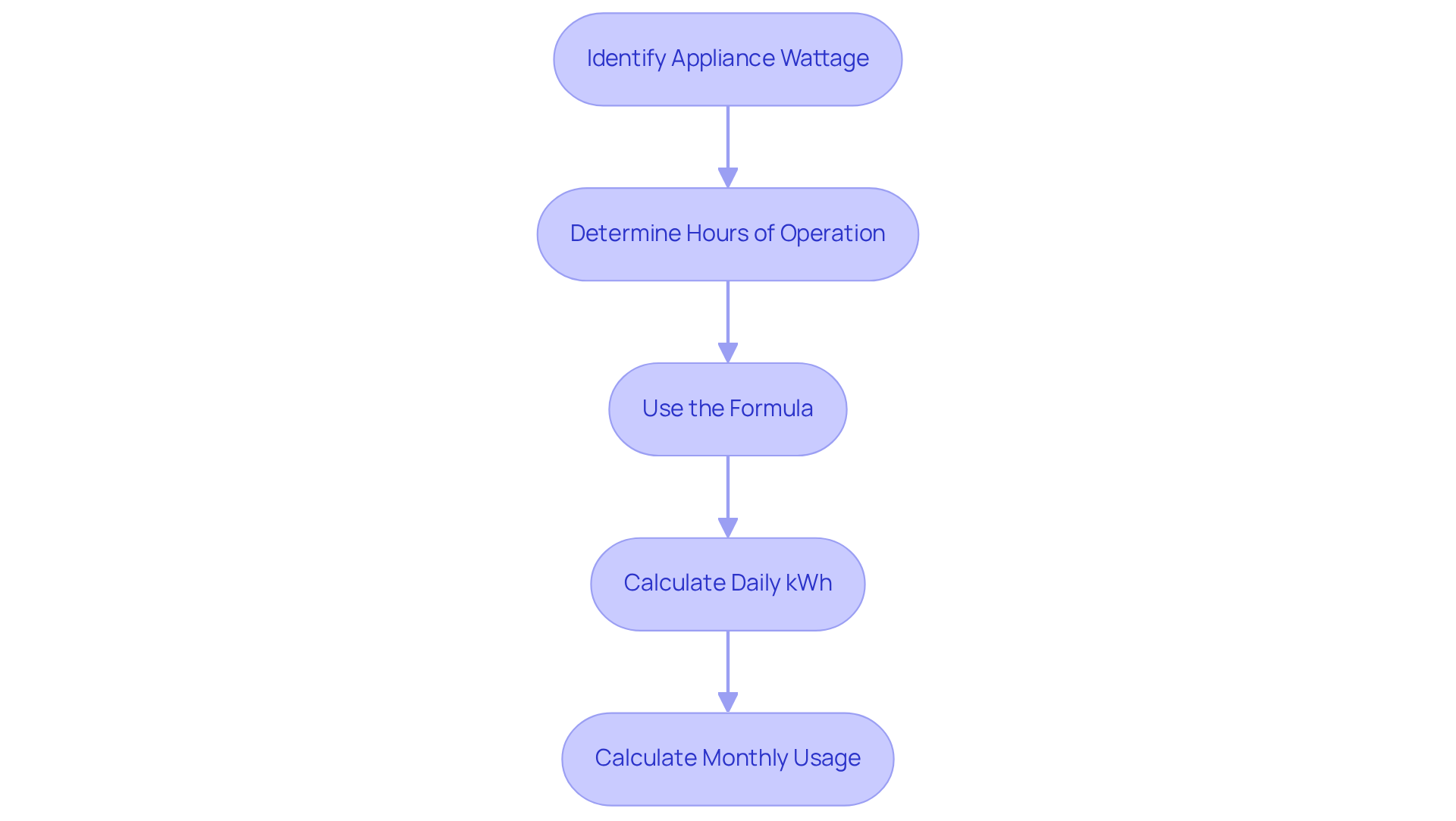Overview
Understanding your energy bills can often feel overwhelming, but grasping the concept of kilowatt-hours (kWh) is a crucial step towards taking control of your energy consumption. This fundamental unit of energy measurement is not just a number on your bill; it represents the potential for significant savings and a more sustainable lifestyle. By learning how kWh relates to your energy usage, you can make informed decisions about energy-efficient appliances and practices that not only reduce your utility costs but also contribute to a healthier planet.
It’s common to feel uncertain about how to navigate the world of energy consumption. However, embracing energy independence through solar energy can be a transformative solution. Imagine the peace of mind that comes with knowing you’re generating your own power and reducing your reliance on traditional energy sources. Together, we can explore the benefits of solar energy, which not only empowers you but also supports a sustainable future for everyone.
As you reflect on your energy habits, consider the impact that small changes can make. What if you could lower your energy bills while also making a positive contribution to the environment? By understanding kWh and its implications, you are already taking the first step towards a more eco-friendly lifestyle. Let’s work towards making informed choices that align with your values and aspirations.
In conclusion, we’re here to support you on this journey. By grasping the significance of kilowatt-hours and exploring energy-efficient solutions, you can achieve both financial savings and a sustainable lifestyle. If you’re ready to take the next step towards energy independence, don’t hesitate to reach out. Together, we can create a brighter, more sustainable future.
Introduction
Understanding energy consumption is more crucial than ever as households strive to manage costs and embrace sustainability. We understand that rising energy bills can be a source of stress, and the concept of kilowatt-hours (kWh) serves as a fundamental metric in this journey, illuminating how energy is consumed over time and its impact on utility bills.
By delving into the intricacies of kWh, homeowners can unlock strategies for significant savings and make informed decisions about energy-efficient appliances and practices. It’s common to feel overwhelmed by the rising energy costs and the complexity of energy bills.
However, how can individuals effectively harness this knowledge to reduce their consumption and enhance their financial well-being? Together, we can explore the benefits of energy independence and sustainable solutions that not only ease your financial burden but also contribute to a healthier planet.
Define Kilowatts and Kilowatt-Hours: Core Concepts of Energy Measurement
Kilowatts (kW) and [understanding kWh](https://gopowercoreinc.com/understanding-solar-energy/understanding-megawatt-kilowatt-key-concepts-and-applications) are essential units of measurement in the power industry, and we recognize that navigating these concepts can feel overwhelming. A kilowatt signifies the rate of power consumption, equating to 1,000 watts. On the other hand, understanding kWh helps quantify the usage of power over time, showing how much power is utilized when a device runs at 1 kilowatt for one hour. For instance, running a 1,000-watt appliance for one hour results in a consumption of 1 kWh.
Grasping these ideas is crucial for homeowners like you, who are seeking to enhance resource usage and lower expenses, especially when it comes to understanding kWh in relation to solar power options. In 2025, the average California household consumes approximately 10,791 kWh annually, translating to about 899 kWh per month. By understanding kWh, you can grasp how it affects your utility costs and make informed choices about efficient appliances and practices.
Imagine the difference you could make by swapping an older refrigerator for an ENERGY STAR® certified model, potentially saving roughly 33% on power usage. This change could greatly . Furthermore, simple practices like switching off lights when leaving a room can lead to further reductions in power consumption.
Moreover, it’s important to consider the benefits of solar heating systems, which can be categorized into active and passive types. Active solar heaters use pumps and controls to circulate heat transfer fluids, while passive systems rely on building design to optimize heat absorption. By utilizing your understanding of kWh and examining these solar options, you can effectively control your usage, resulting in significant savings and a more sustainable lifestyle.
Together, let’s explore these opportunities for energy independence and a brighter, more sustainable future. We’re here to support you every step of the way.

Explore the Role of kWh in Energy Bills and Daily Consumption
is essential because kilowatt-hours (kWh) play a crucial role in determining your utility bills, as companies charge based on the total kWh consumed during a billing cycle. We understand that this can be a source of concern for many homeowners. For instance, if a household uses 900 kWh in a month at a rate of $0.12 per kWh, the resulting bill would be $108.
Recognizing daily patterns through understanding kWh is vital for identifying trends and potential areas for improvement. If power consumption increases at certain times, homeowners can adjust their habits or invest in energy-efficient devices to help lower costs.
In California, where the average monthly electricity usage is around 571 kWh, tracking usage can lead to significant benefits. By implementing simple strategies, such as:
- Setting electric water heaters to 120°F
- Running full loads in washers and dishwashers
- Considering solar power solutions
homeowners can reduce their reliance on grid electricity. These changes not only lead to lower kWh consumption but also substantial savings. Some homeowners have reported reductions of over 90% on their electricity bills after installing solar panels.
Moreover, incorporating passive power collection designs, such as large south-facing windows, can further enhance efficiency. As energy costs continue to rise, understanding kWh consumption is becoming increasingly important for effectively managing expenses while exploring the economic and environmental benefits of solar heating systems. Together, we can work towards a more sustainable future for our homes and communities.

Calculate Your kWh Usage: Step-by-Step Guide to Energy Consumption
Calculating your kWh usage is a straightforward process that can be achieved in just a few simple steps, helping you gain a clearer understanding of your energy consumption and its impact on your bills.
-
Identify the wattage of your appliances: Begin by checking the label on your appliance to find its wattage. For instance, a typical refrigerator may use around 200 watts.
-
Determine the hours of operation: Estimate how many hours the appliance runs each day. If the refrigerator operates continuously, it would be 24 hours.
-
Use the formula: To calculate the daily kWh usage, apply the formula:
kWh = (Wattage × Hours Used) / 1,000For our refrigerator example:
kWh = (200 watts × 24 hours) / 1,000 = 4.8 kWhThis indicates that the refrigerator consumes 4.8 kWh per day.
-
Calculate monthly usage: Multiply the daily kWh by the number of days in a month (e.g., 4.8 kWh × 30 days = 144 kWh per month).
By following these steps, you can gain valuable insights into your power usage patterns. Did you know that refrigerators represent just under 7% of a home’s electricity usage? Upgrading to an ENERGY STAR-certified model can lead to significant savings on your power bills. Moreover, maintaining proper temperature settings and ensuring good ventilation can further enhance efficiency, making your home more energy-friendly.
Understanding your power usage is essential, especially when considering solar power options. By understanding kWh consumption, you can more accurately identify your home’s solar power requirements. This knowledge empowers you to make informed decisions about energy efficiency and explore potential solar energy solutions. Together, we can reduce your energy costs and lessen your environmental impact, paving the way for a more sustainable future.

Conclusion
Understanding kilowatt-hours (kWh) is essential for anyone looking to manage energy consumption more effectively and save on utility costs. We understand that energy bills can be a source of stress, but by grasping the significance of kWh, you can make informed decisions about your energy use. This knowledge not only leads to reduced bills but also fosters a more sustainable lifestyle. The concepts of kilowatts and kilowatt-hours serve as foundational knowledge that empowers you to optimize your energy consumption and explore renewable energy options like solar power.
This article delves into critical insights, such as:
- How kWh directly influences energy bills
- The importance of identifying daily consumption patterns
- Practical steps to calculate kWh usage
Simple actions, such as upgrading to energy-efficient appliances and adopting mindful energy practices, can yield substantial savings. Additionally, integrating solar heating solutions can further enhance your energy independence, demonstrating the profound impact of understanding kWh on both your personal finances and environmental sustainability.
In conclusion, the journey toward energy efficiency begins with knowledge and awareness. By actively engaging with the concepts of kWh and implementing energy-saving strategies, you can contribute to a more sustainable future while enjoying significant financial benefits. Embracing these practices not only leads to lower energy costs but also fosters a collective effort toward environmental stewardship. Together, we can take control of energy consumption—making informed choices today will pave the way for a brighter, greener tomorrow.


